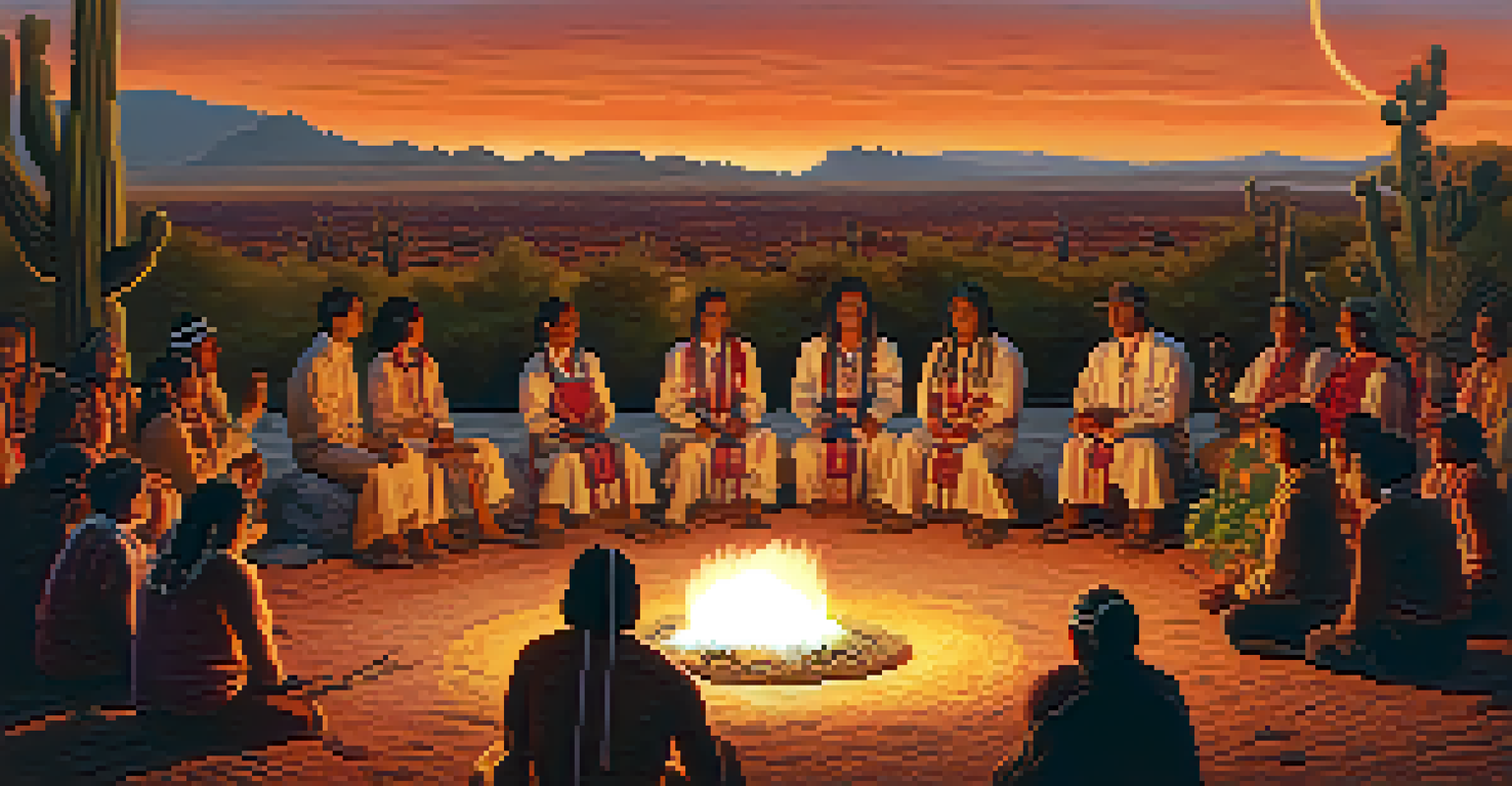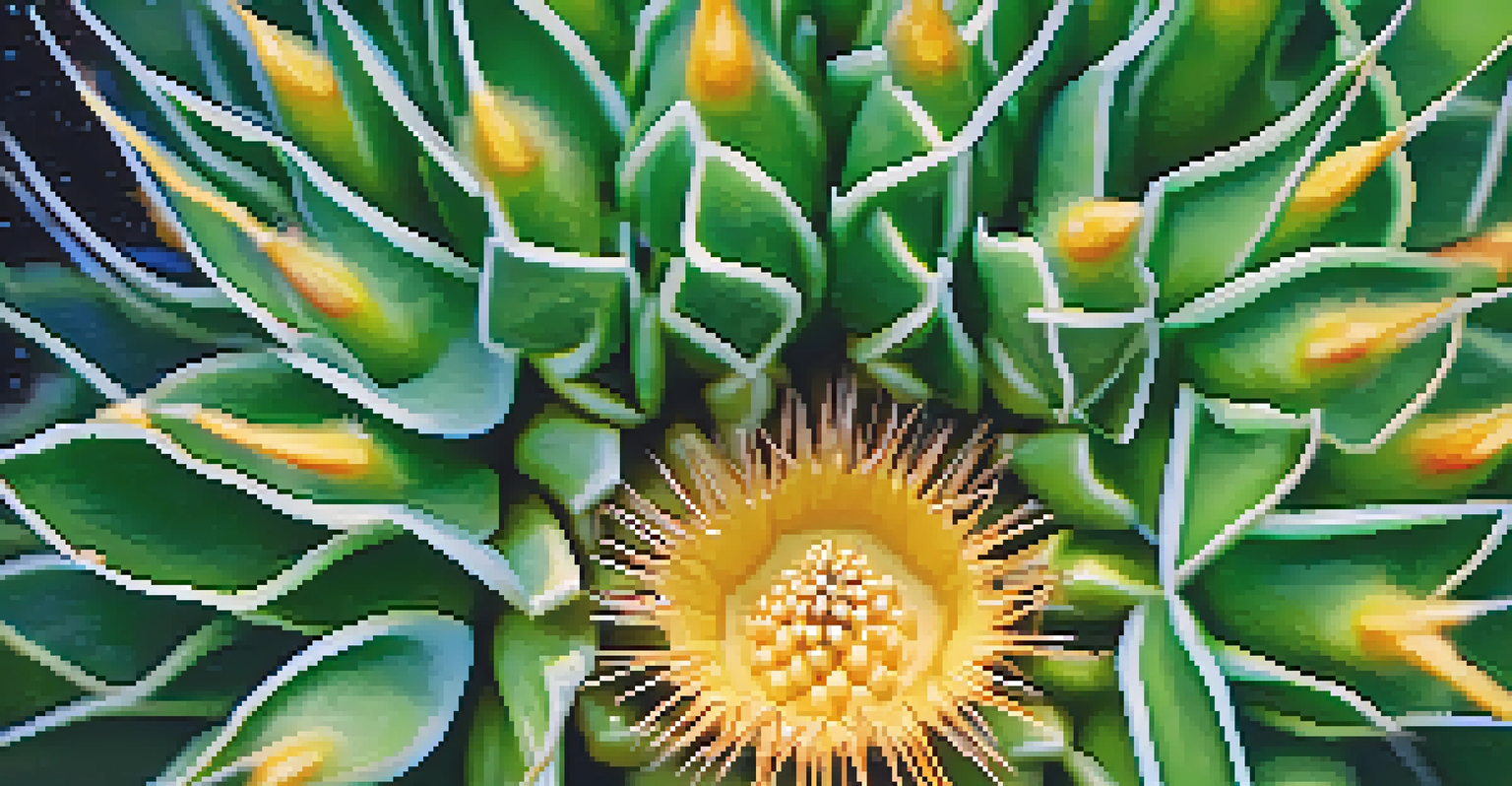Cultural Appropriation: The Ethics of Peyote Use Today

Understanding Peyote: A Sacred Plant with Deep Roots
Peyote, a small cactus native to Mexico and the southwestern United States, has been used for thousands of years by Indigenous peoples for its psychoactive properties. In many Native American cultures, peyote is not just a plant; it's considered a sacrament that facilitates spiritual connection and healing. Understanding its cultural significance is crucial when discussing its use in contemporary society.
Cultural appropriation is the act of taking or borrowing elements from one culture by members of another, often without permission or understanding.
For many Indigenous communities, peyote ceremonies serve as a vital aspect of their identity and heritage, promoting community bonding and cultural continuity. The rituals surrounding peyote use are deeply intertwined with their stories, beliefs, and practices. This rich tapestry of meaning contrasts sharply with the often casual, superficial ways in which peyote is sometimes appropriated by non-Indigenous individuals.
By recognizing the profound roots of peyote in Indigenous culture, we can begin to appreciate the complexities of its use and the ethical considerations that arise when it crosses cultural boundaries.
Cultural Appropriation: Defining the Concept
Cultural appropriation refers to the act of taking or borrowing elements from one culture by members of another, often without permission or understanding. This practice can lead to the commodification of cultural symbols, stripping them of their original meanings and contexts. In the case of peyote, non-Indigenous use can diminish its sacredness and significance in Indigenous traditions.

The debate around cultural appropriation is often framed by power dynamics, where dominant cultures exploit marginalized cultures for profit or trendy experiences. This power imbalance raises important ethical questions about who gets to use what and under what circumstances. Understanding these nuances is essential for fostering respectful intercultural relationships.
Peyote's Cultural Significance
Peyote is a sacred plant for Indigenous peoples, integral to their spiritual practices and identity.
As we navigate these discussions, it’s important to consider the voices of those from the cultures being appropriated. Listening to Indigenous perspectives on peyote use can help inform a more respectful approach to cultural exchange.
The Role of Legal Protections and Indigenous Rights
In the United States, the use of peyote is legally protected for members of federally recognized Native American tribes under the American Indian Religious Freedom Act. This law acknowledges the importance of peyote in spiritual practices and seeks to safeguard the rights of Indigenous peoples. However, this legal framework does not extend to non-Indigenous individuals, raising questions about ethical consumption.
By recognizing the profound roots of peyote in Indigenous culture, we can begin to appreciate the complexities of its use and the ethical considerations that arise when it crosses cultural boundaries.
Legal protections highlight the need for a broader conversation about Indigenous sovereignty and self-determination. Many Indigenous leaders advocate for the right to control their cultural practices and resources, including peyote. This control is vital for ensuring that cultural elements are used respectfully and meaningfully.
As society debates the ethics of peyote use, it’s essential to amplify Indigenous voices and support their rights to practice their traditions freely and without exploitation.
Peyote in Popular Culture: A Double-Edged Sword
In recent years, peyote has gained popularity in mainstream culture, often appearing in music, art, and literature. While this visibility can promote awareness of Indigenous cultures, it can also lead to misconceptions and trivialization of peyote's significance. Popular portrayals may reduce a sacred practice to mere entertainment, perpetuating stereotypes and harm.
The commercialization of peyote raises ethical concerns about who benefits from its popularity. Non-Indigenous individuals and businesses often profit from selling peyote-related products or experiences, while Indigenous communities may not see any returns or acknowledgment. This disparity highlights the need for ethical engagement with Indigenous cultures.
Ethical Issues in Cultural Use
Cultural appropriation poses ethical challenges in the use of peyote, often stripping it of its original meaning.
Recognizing peyote's dual role in popular culture prompts us to reflect on how we engage with and respect cultural elements, especially those that are sacred to others.
Ethical Practices for Non-Indigenous Individuals
For those interested in peyote use, it is crucial to approach the subject with respect and awareness. This means understanding the cultural significance of peyote and seeking to learn from Indigenous peoples rather than appropriating their practices. Engaging with Indigenous communities and respecting their boundaries is essential for ethical participation.
One way to honor Indigenous practices is to support Indigenous-led initiatives and organizations that promote cultural education and preservation. By investing in these communities, non-Indigenous individuals can help ensure that cultural practices are respected and sustained. This fosters a more equitable relationship between cultures.
Ultimately, ethical engagement involves listening, learning, and acknowledging the history and context behind peyote use. This approach promotes mutual respect and understanding, allowing for genuine cultural exchange.
The Future of Peyote Use: Navigating Challenges
As the popularity of peyote continues to grow, so do the challenges surrounding its use. Climate change and overharvesting threaten the natural habitats of peyote, putting Indigenous practices at risk. This environmental concern highlights the need for sustainable practices and awareness about the impact of consumption on natural resources.
Furthermore, as more people become interested in peyote for its psychoactive effects, the potential for exploitation increases. Non-Indigenous individuals may inadvertently contribute to the commodification of a sacred plant, undermining its significance within Indigenous cultures. Addressing these challenges requires a collective effort to protect both the plant and the cultural practices associated with it.
Protecting Indigenous Rights
Legal protections for peyote use highlight the need to respect Indigenous sovereignty and ensure ethical engagement.
By advocating for sustainable practices and supporting Indigenous rights, we can work towards a future where peyote is honored and respected, rather than exploited.
Conclusion: Cultivating Respect and Understanding
The discussion around peyote use is complex, touching upon cultural significance, ethical considerations, and the rights of Indigenous peoples. It's essential to approach this topic with an open mind and a willingness to learn from those who have historically and culturally connected with peyote. By doing so, we can foster a deeper appreciation for its role in Indigenous spirituality.
Cultivating respect for Indigenous cultures involves not only understanding their practices but also supporting their rights and sovereignty. This respect can pave the way for meaningful conversations about cultural exchange that honor the histories and identities of Indigenous communities.

As we navigate the ethics of peyote use today, may we strive for a future rooted in mutual respect, understanding, and solidarity with Indigenous peoples.